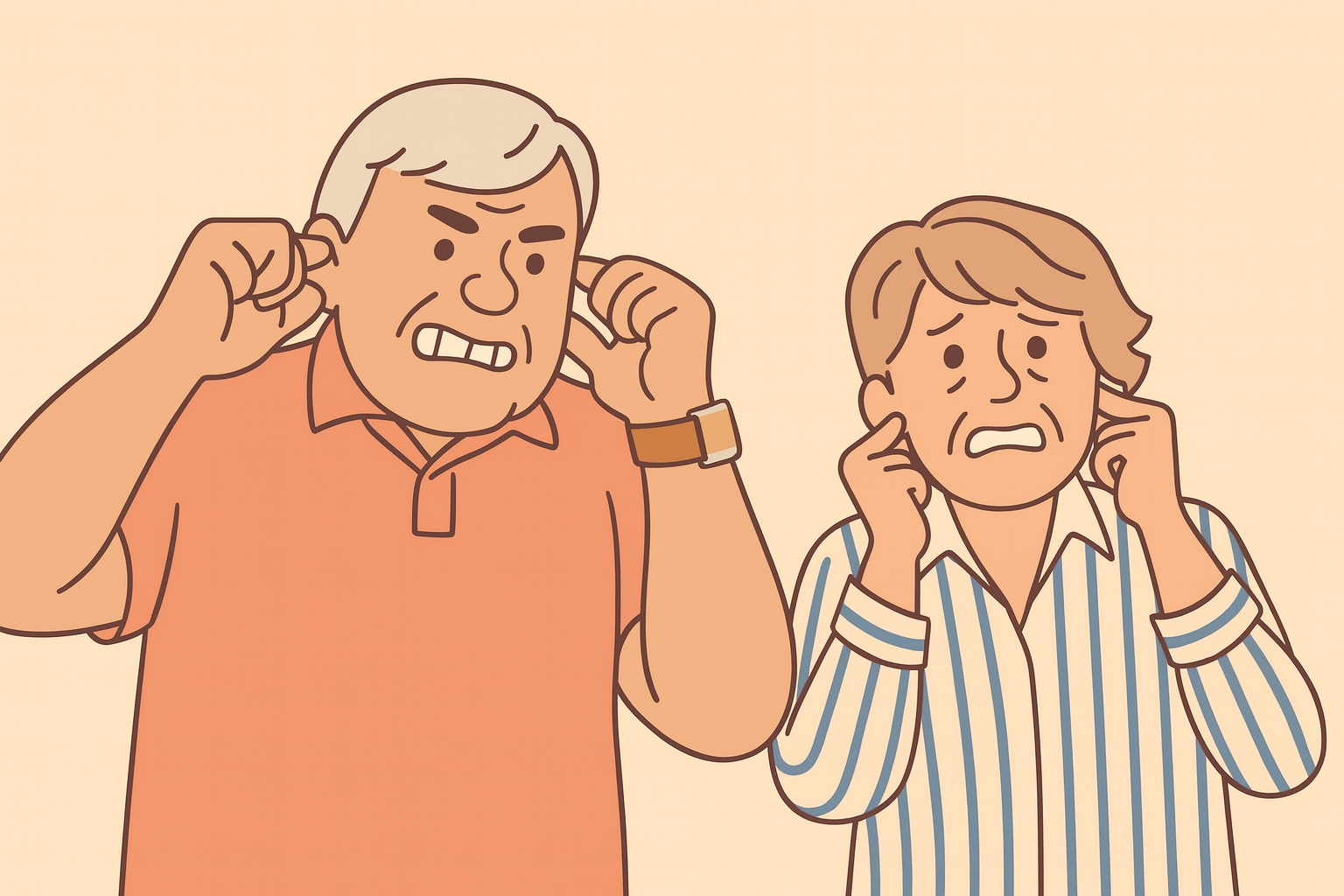
10 Most Annoying Sounds and Tips to Handle Them
If you suffer from any or all of the symptoms mentioned hereunder, we recommend that you consult with your healthcare provider. Always seek the advice of a physician or other qualified healthcare provider with any questions regarding a medical condition.
We live surrounded by sounds. Some are pleasant, but some noises can annoy most people or even harm your hearing. Hearing aid users often feel overwhelmed by rediscovering sounds that may pass undisturbed for most people. Starting to use a hearing aid can also amplify annoying sounds.
This blog post will walk you through the top 10 annoying sounds that can disrupt daily life. It will also provide practical tips to handle annoying sounds effectively.
Learn how audiologists can help manage sound sensitivity and improve your overall well-being.
What Makes a Noise Annoying?
Sounds and noise are part of our everyday lives. So, as annoying as a sound may be, sometimes it is inevitable. Some sounds are perceived by our brains as a potential attack because of their particular decibel level and frequencies (for example, alarms, high screeching sounds), causing some people to become anxious and irritable when hearing them and Introducing the concept of annoying sounds.
What are some examples of common annoying sounds? Researchers found that unpleasant sounds range between 2000 and 5000 Hz, where human ears are most sensitive.
Some everyday sounds in that range may include car alarms, squeaky doors, high-pitched screeching, crying children, and more. Even loud snoring or chewing noises can be disturbing for sensitive people.
Annoying Noises Can Impact Your Health and Hearing.
While humans may learn to live in a noisy environment, such as workplaces, extremely loud sounds can damage the ears and cause hearing conditions, such as hearing loss and tinnitus. If you work in an environment with constant noise, you must protect your ears with noise-cancelling headphones.
Understanding the effects of annoying sounds on mental and physical health is critical to handle them. Annoying sounds can have a detrimental effect on mental health. Our brains are always alert, even while we sleep, checking our environment for signs of danger. That is why loud noises don’t let you sleep, triggering stress or discomfort.
According to researchers, the mental health effects of noise pollution include:
- Sleep disturbances
- Stress
- Cognition problems
- Attention deficits
- Memory impairment
- Learning impairment
But annoying sounds and noise pollution affect your physical health. Some effects include:
- Hearing loss
- Tinnitus
- Hyperacusia (hypersensitivity to sound)
- Exacerbating cardiovascular disease
- Worsening type 2 diabetes
If you suffer from hearing loss, tinnitus or hyperacusia, don’t hesitate to book a free online appointment with our audiologists. They will guide you throughout the different options which could alleviate your symptoms and solve some of the issues.
The Top 10 Most Annoying Sounds
Why some noises annoy us, and others don’t have been a mystery for scientists. Moreover, why some sounds are universally irritating is an even bigger mystery. In recent years, a professor of Acoustic Engineering at Salford University researched the most irritating sounds. Some of the noises most voted for by participants included a baby’s cries, microphone feedback, or the renowned nails on a chalkboard.
Here are the top 10 annoying sounds:
1. Nails on a chalkboard
This one is a classic and is universally considered one of the most hated sounds. The reason it irks us so much is twofold. First, it is high-pitched, which puts it in the 2000-5000 Hz range of annoying sounds. Second, it reverberates in our ears, so we feel an unpleasant sensation in our teeth.
2. Car alarms
Car alarms are designed to call people’s attention, so they are loud, repetitive and incredibly annoying. Car alarms can reach 90 to 110 decibels which are louder than the 85 decibels limit for safe hearing. Because they are so loud, they can even cause physical pain to the ears.
3. Loud chewing or slurping
Eating with someone slurping and chewing loudly can be annoying if it is not culturally accepted in your culture. But some people experience rage or intense disturbance when they hear the sound of people chewing, yawning or throat clearing. This disorder is called misophonia, and its causes are not clear.
4. Fingernails on a hard surface
Like on a chalkboard, rubbing or tapping nails against a hard surface can be irritating, especially for sensitive people.
5. Squeaky doors or hinges
This sound is caused by the rubbing of metal on metal, which happens when there is a build-up of dirt in the hinges. This sound is annoying because we cannot avoid opening and closing doors. They produce a high-pitched sound, which can create a disturbing sensation in our teeth or ears.
6. High-pitched screeching
As we said before, screeching sounds trigger an alarm response in our brains because of the high frequency and intensity of the waves. When we hear these sounds, we tend to flee the origin of the sound.
7. Heavy construction noises
Construction is one of the noisiest work environments, with a high risk of noise-induced hearing loss. Prolonged exposure to sounds above 85db can cause hearing loss, and most commonly used construction equipment noises range from 84db for a backhoe to a pneumatic chipping hammer at 110db.
Not only workers are affected by this problem, but also neighbours who are exposed daily to the noises in the construction site.
8. Persistent honking or sirens
We all have experienced how noisy can be a traffic jam. Persistent honking can be extremely annoying and disturbing. The noise of an automobile horn is extremely loud, which can be annoying and even increase the risk of heart disease.
9. Crying children
The sound of a crying child or baby is stressful for humans. It is impossible to ignore because it activates our flight or fight response.
10. Loud snoring
Loud snoring can trigger and annoy many individuals. Almost everyone can find it hard to sleep beside someone snoring loudly. Because a person’s hearing is designed to focus on nearby sounds, even while sleeping, so loud snoring can be difficult to ignore. Some snores have a rhythm, so it can be easier to lull yourself to it, but most are random.
Tips for Handling Annoying Sounds
There are several techniques for coping with annoying noises
1. Creating a calm and quiet environment at home
If you are exposed to annoying or loud noises, you can counteract some of their effects by creating a quiet atmosphere at home. By doing this, you can alleviate some of the stress it involves.
2. Using noise-cancelling headphones or earplugs
These methods are instrumental if you are regularly exposed to a loud environment. For instance, construction workers must use noise-cancelling headphones. In other settings, for example, when exposed to loud snoring, you can protect your hearing by wearing earplugs.
3. Incorporating white noise or calming background sounds
Is the relentless noise from neighbours or traffic making you mad and disrupting your sleep? Annoying sounds are frustrating because most of them are out of our control. Thankfully, the human brain doesn’t need to be in complete silence to sleep but just to be away from alarming sounds.
If you cannot eliminate the annoying noise, try to blur it out. Distracting your brain with safe, neutral sounds can be as simple as putting calming background sounds, such as the ocean or nature sounds. You can invest in a white noise machine or use an application. If nature sounds and relaxing music is more your thing, YouTube has a great selection you can set on a loop.
4. Managing stress through relaxation techniques
Constant exposure to noisy environments can be stressful and be detrimental to your physical and mental health. Learning how to relax is an important technique you can master to help manage your stress.
You can add apps to your phone to guide you through breathing exercises and meditation. There are special meditations for noise tolerance, and you can learn relaxation techniques for noise irritation. Also, you can consider joining a yoga class. The practice of yoga breathing is known to be very helpful.
5. Fix what is causing the noise.
If the cause of the annoying noise is something that can be fixed, then you have a solution. Use WD-40 or similar lubricant for the hinges if the doors are squeaky. If there is a leaky tap or a humming radiator, bring a technician to fix it. If your partner is snoring, it is time to convince them to visit the doctor.
6. Seeking professional help for sleep disruptions due to annoying sounds
If there is no solution for the noise and you have trouble sleeping, it could be a good idea to seek the doctor’s help. Your general practitioner can prescribe medication or therapies to help with your sleep disturbance.
7. Soundproofing areas prone to annoying noises
Another simple but effective solution may be to soundproof your windows and doors. There are several soundproofing solutions for annoying sounds. For example, use soundproofing tape to isolate where the noise comes from. You can also use wallpaper or tapestries.
8. Seeking professional help from audiologists for hyperacusis or sensitivity to sounds
The heightened sensitivity to everyday sounds is called hyperacusis and can affect the individual’s daily life. People with hyperacusis perceive specific everyday sounds as loud or painful. At Auzen, our certified audiologists can help with treating hyperacusis. They can recommend specific sound therapy.
Why Should You Consult an Audiologist if You Have Sensitivity to Sound?
If you have heightened sensitivity to sound, you may have tried to avoid triggers by wearing earplugs or avoiding noisy environments. However, treatment of noise sensitivity requires seeing a health professional. An audiologist can provide sound therapy most comfortably, even via smartphone apps.
The first step for this and other hearing issues is to take a hearing screening test.
Check if you are hearing loss for free and in under 3 minutes thanks to our online hearing test.
If your online hearing test shows you have a degree of hearing loss, you can book a commitment-and-charge-free online appointment with our audiologists who can help tailor a solution for your specific hearing problem.
Sources:
Harvard Health Publishing - "Sensitivity to Noise: It's Not Just Your Ears" - Link
National Sleep Foundation - "How to Block Out Noise at Night" - Link
Scientific American - "The Psychophysiology of Annoying Sounds" - Link
American Tinnitus Association - "Sound Therapy" - Link

Leave a comment
This site is protected by hCaptcha and the hCaptcha Privacy Policy and Terms of Service apply.